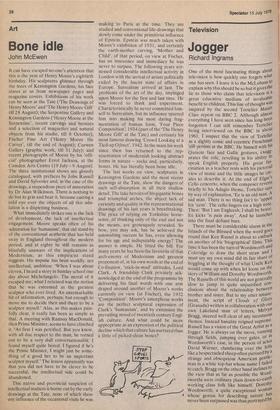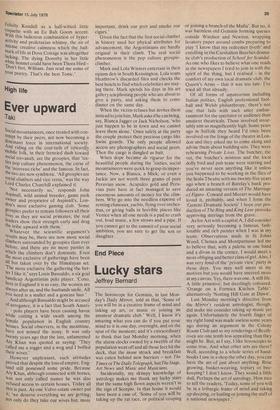Television
Jogger
Richard Ingrams
One of the most fascinating things about television is how quickly one forgets what one has seen. I leave it to the McLuhans w explain why this should be so but it gives the lie to those who claim that television IS 3 great educative medium of invaluable benefit to children. This line of thought was inspired by the second Tortelier Master Class repeat on BBC 2. Although almost everything I have seen since has long been forgotten I can still remember Tortelier being interviewed on the BBC in about 1961. Y suspect that the view of Tortelier as a slightly comic and eccentric Frenchman. still persists at the BBC. He himself with his Quixote face and Gallic gestures, exaggorates the role, revelling in his ability to speak English properly. His great fas" cination as a teacher rests with his pictorial view of music and the little images he creates to describe it. At the end of Elgar s Cello concerto, when the composer reverts briefly to his Adagio theme, Tortelier says by way of explanation, `Ee is an old man. A sad man. There is no thing (sic) to 'aPPen for 'eem'. The cello lingers on a high note. Then: 'But I am Engleesh, I shall be brave. Ee kicks 'is pain away'. And he launches into the final defiant bars.
There must be considerable alarm in the Islands of the Blessed when the word goes round that Ken Russel is about to embark on another of his 'biographical' films. Thls time it has been the turn of Wordsworth and Coleridge to draw the short straw and I must say my own mind did its fair share of boggling at the thought of what Uncle Ken would come up with when let loose on the story of William and Dorothy Wordsworth. The Russells of this world are not generally slow to jump to quite unjustified conclusions about the relationship between brother and sister. But to my utter amazement, the script of Clouds of Glory (Granada) written in collaboration with our own Lakeland man of letters, MelvYn Bragg, steered well clear of any incestuous themes. Instead banality reigned supreme' Russell has a vision of the Great Artist as a Jogger. He is always on the move, running through fields, jumping over gates, or in Wordsworth's case, in the person of actor David Warner, clambering over the fells like a bespectacled sheep often pursued by a strange and obsequious American gentleman in a white top-hat whose name I failed to catch. Bragg on the other hand inclines to the view that as far as possible the Word: sworths were ordinary plain down-to-eartii working class folk like himself. DorothY Wordsworth, a quite exceptional woman whose genius for describing nature has never been surpassed was thus portrayed bY Felicity Kendall as a half-witted little coquette with an Ee Bah Goom accent. With this ludicrous combination of hyperactivity and proletarian whimsy, the air of Intense creative calmness which the hallmark of life at Dove Cottage was altogether lacking. The dying Dorothy in her little White bonnet could have been Thora Hird — Don't fret, William. Just read me some of Your poetry. That's the best Tonic.'



































 Previous page
Previous page